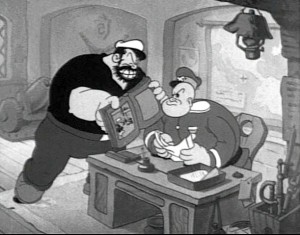 Our old friend Giuseppe Arcimboldo is on our mind today, as he should be on yours. Arcimboldo, you may recall, is the great fruit and vegetable guy of the 16th century, the painter who made a splendid living by portraying people in botanic form, and he could twist a turnip like nobody’s business if that was what he needed to do to turn a proper chin.
Our old friend Giuseppe Arcimboldo is on our mind today, as he should be on yours. Arcimboldo, you may recall, is the great fruit and vegetable guy of the 16th century, the painter who made a splendid living by portraying people in botanic form, and he could twist a turnip like nobody’s business if that was what he needed to do to turn a proper chin.
The old agrarian image-monger comes to mind because of today’s news that the European Union, an outfit that really should have known better in the first place, has scrapped its rules banning the display and sale of ugly fruits and vegetables in supermarkets. Well, it’s lifted the ban, sort of. Come July, when the rules change, you can get a misshapen pea or plum but not, for instance, an ugly apple or tomato (and everyone knows the ugly tomatoes are generally the best-tasting). The continent that brought us such notable advocates of lookalike symmetry as Napoleon and Hitler will allow you to buy or sell certain misshapen produce so long as they’re labeled substandard or intended for cooking or processing.
Then again, how are the bureaucrats going to know what you do with your zany zucchini once you get it home? What if you slice it and eat it raw? What if you turn it into ratatouille? What if you make holes in it and hang it from your ears? What if you prop it on your kitchen counter and turn it into LIVING ART?
A Certain Member of Our Household is an inveterate (some might say shameless) collector of oddball fruits and vegetables, the more twisted and deformed the better, and it’s a trait we’ve come to cherish. Up with skewed squash! Down with boring, blandly beautiful Golden Delicious apples! Mutts of the botanical world, the battle is yours!
On a regular basis ACMOH arrives home from the grocery store or farmers market with something truly glorious: a turnip that looks as if it’s been trained by a psychotic bonsai artist; an eggplant with troll-size warts; a carrot with forked tongue; a tomato like lumpy gravy. It becomes the center of conversation, the subject of visual admiration, yea, the philosophical warrior of freedom in the great battle for variety as the spice of life. It holds center stage as it slowly deteriorates. Then it becomes compost, or dinner. And soon, a new beautiful monstrosity takes its place.
Europe, you disappoint us, although you seem to be coming to your senses. You never would have gone so stultifyingly astray if you’d kept your eye on Arcimboldo. And he’s a native son.
*********************************
Meanwhile, the curtain has come down semi-successfully on the latest act in the Sherwood Follies: The town’s school board has decided that John Gardner‘s novel Grendel will not be removed from the reading list in the sophomore honors English class, in spite of insistent complaints from a tiny group of distressed parents. (Sherwood is the Oregon town, you’ll recall, where a middle school principal last school year banned performance of a play about bullying, again prompted by a small number of angry parents.)
 Not a lot of people have spotted the irony simmering at the bottom of this tempest-toss’d teapot, which was brought to a boil because of moral objections to some particularly gruesome violent acts on the part of Gardner’s central character, the notorious monster slain by the hero Beowulf. Gardner, back in the 1970s, loudly and prominently declared himself ON THE SIDE OF MORALITY — although his idea of morality was quite different from the hide-your-eyes-and-hunker-down version advocated by so many self-styled moral guardians these days. Here’s what Lore Segal has to say about Gardner’s stand in her fascinating, finely written introduction to a recent reprint of Gardner’s 1978 book On Moral Fiction. (The whole essay’s worth reading, and probably the book, too, which I found stimulating, even though I disagreed with large chunks of it, when it first came out. I haven’t reread it since):
Not a lot of people have spotted the irony simmering at the bottom of this tempest-toss’d teapot, which was brought to a boil because of moral objections to some particularly gruesome violent acts on the part of Gardner’s central character, the notorious monster slain by the hero Beowulf. Gardner, back in the 1970s, loudly and prominently declared himself ON THE SIDE OF MORALITY — although his idea of morality was quite different from the hide-your-eyes-and-hunker-down version advocated by so many self-styled moral guardians these days. Here’s what Lore Segal has to say about Gardner’s stand in her fascinating, finely written introduction to a recent reprint of Gardner’s 1978 book On Moral Fiction. (The whole essay’s worth reading, and probably the book, too, which I found stimulating, even though I disagreed with large chunks of it, when it first came out. I haven’t reread it since):
“The purpose of criticism, said John Gardner, was not to belabor the distinctions between modernism and postmodernism but to look at the real end of all art, which is Beauty, Truth and Goodness, as decent folk have known all along.”
Even, apparently, a solid majority of the decent folk of Sherwood. Gardner, by the way, took a lot of heat for the position he staked out in On Moral Fiction, and its publication undoubtedly did serious harm to his career. But he was stubborn in his belief that morality is difficult yet definable, and that it plays a central role in art. Grendel had a case to be made, and Gardner let him make it pretty well. Caliban had a case, too. And Frankenstein’s monster. Ugly vegetables, all, perhaps, but fascinating — and instructive — in their own ways.




